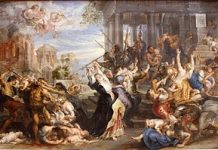In Ireland, my ancestors were offered a devil’s bargain by the otherwise good people during the potato famine. At that time, well-intentioned but misguided folk would provide soup to starving Irishmen on the condition that they renounce their Catholic Faith. The sentiment of the Irish peasants was expressed in the song that they sang in the streets of Dublin:
“Souper souper ring your bellsouper souper go to hell.”
My paternal ancestors faced a similar problem only three hundred years earlier, in Lancashire, over the question of the King’s divorce. Curiously, most of the Catholic hierarchy accepted the divorce, hoping to prevent their own martyrdom but, in the end, only delaying it. The abbot of Glastonbury was martyred after being betrayed by his servant Jack Horner. Horner received the Abbey as his reward, an event that has also been immortalized in verse, using milder language but equally pungent in ironic meaning:
“Little Jack Horner sat in a corner, eating his Christmas Pie; he stuck in his thumb and pulled out a plum and said what a good boy am I.”
In both cases the choice was to compromise with the cultural regime and the state religion or face the consequences: either God or Caesar, with a Caesar not content with anything less than that which was owed to God.
In our culture, the closest thing we have to a state religion is the worship of scientific knowledge, which is really just the worship of man. Now, the scientific method is a good thing, perhaps one of the most important intellectual inventions of history, and we must not rid ourselves of the error by undervaluing scientific pursuit. We believe in scientific progress because we know that reason is one of the ways in which we are made in God’s likeness, and to attack science is to attack reason. Indeed, the Catholic Church is one of the few remaining institutions that still believes in reason and the scientific method. Consider the following example from a time when Quebec was a Catholic nation. It comes from a book written by a self-described Ontario Orangeman, William Moore: The Clash! A Study in Nationalities. While he was no lover of Catholics, he was an honest historian and, in 1919, he described Catholic education in Quebec as follows:
“The priests of Quebec are teaching their parishioners the doctrine that a thing well done on the farm is a thing worthwhile for its own sake … [but that is not all; for example,] an order of missionaries in the province … periodically make a retreat for meditation and study. And the objects of their thought? The care of bees, the best fruits to grow on the farm, melon-culture, manuring, the breeding of horses, cooperation, dairying in all its branches, aviculture, apiculture, horticulture, and, in general, all that has to do with agriculture. They are ‘Agricultural Missionaries, organised by the Catholic Bishops of the Ecclesiastical Province of Quebec in the year 1894.’ In one year they carried the gospel of God’s land to 145,250 listening farmers.”
This is the true history of the Church and its relationship to learning and scientific reasoning in Canada, and it is the opposite of the modern stereotype of traditional Quebec culture dished up by the newspapers.
If we ask a scientist if eating a bowl of soup can kill the soul, we will be told, if the scientist is honest, that the question is not a scientific question. If we ask a scientist if the divorce and remarriage of a king can kill the soul of a country, we will again be told that this is not a scientific question.
But they are important questions; they are real questions that we all must answer, for the answer affects everything we do in our life. The problem is really a religious problem, and it is an old problem in modern dress: is creation good, is human life good? While there is no scientific answer, the right religious answer is “YES.” Any other answer is a lie, and any who say otherwise are liars.
We no longer live in a time when Caesar will reward apostasy with a palace or a bowl of soup. Now the reward is to be praised by newspaper editors and the popular press as progressive, liberal, sensitive—a pathetic reward, really, for the loss of one’s soul. And the requisite apostasy is to deny the objective truth of religion about human life, when it begins, what it is, and how it is to be co-created.
I often have thought of starting a club. At this club, the members would have an annual dinner in which a soup course was served from a tureen on a tray, beside it a folded newspaper containing the latest liberal lies in its editorial pages. As each dinner guest was offered soup, the guest would place her or his hands over the bowl in a ritual rejection of the soup.










